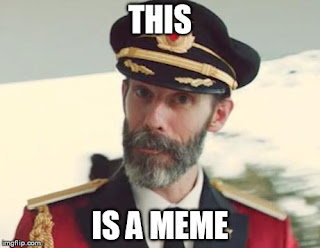The Court Martial of Captain Obvious: A Response to Mr. Wedgeworth
“When someone shows you who they are, believe them the first time.” -Maya Angelou
“Fool me once: strike one. But fool me twice…strike three.” -Michael Scott
In my rebuttal to Steven Wedgeworth's Mere Orthodoxy piece, I leveled several serious accusations against him, including that he employed an "irenic tone and [a] desire to constructively engage" and that he "had charitable motives." In Wedgeworth's recent rebuttal to my and Ron Belgau's rebuttals, he goes a long way toward proving himself innocent of my charges. Besides being insulting and condescending, he complains that I am "dismissive," despite that I took time and attention to engage with his arguments. That isn't dismissiveness.
Calvin wrote, "The pastor ought to have two voices: one, for gathering the sheep; and another, for warding off and driving away wolves and thieves." In my first response to Mr. Wedgeworth, I spoke as if to a sheep, for I believed that he was an earnest ally-in-training, and I did not wish to alienate him unnecessarily. He has, however, shown himself to be a wolf, and it is time for the sheepdog to bare its teeth.
A Basic Reading Comprehension Error?
Wedgeworth wrote in his first post that "it does not appear that the sort of friendship that the Spiritual Friendship writers are after is the ordinary kind of intense friendship experienced by straight men and women. ... When Ron Belgau describes one of his desired friendships, it sounds like a marriage..." When he writes of the kind of friendship he believes Wes and Ron are after, we must take him at his word that he is describing what he believes to be their current position. Wedgeworth later writes, of a similar relationship of Ron's, "Now again, these are Belgau’s memories. He is not prescribing them." This seems to reflect a shift in interpretation by Wedgeworth, though he does not admit this. If he had had the humility to admit his mistake, he might have grown. He might have understood. But he did not.
Instead of admitting his mistake, he blames Ron for his misunderstanding, complaining that he was "confusing" and unclear. C.S. Lewis justly said of men like Mr. Wedgeworth, "The answer to such people is that if they cannot understand books written for grown-ups, they should not talk about them."
The Court Martial of Captain Obvious

Wedgeworth writes, referring to Ron's and my claims that Ron's description of his past desires does not reflect his present values: "It was obvious. A simple matter of the grammar and logical sequence. The only way to make such a mistake would be bad faith or inability. Yet interestingly, neither Belgau nor Bates demonstrate these assertions." Wedgeworth claims it is "interesting" that neither Ron nor I bother to demonstrate claims which we believe are obvious. This is only interesting to someone who does not understand basic rules of argumentation. To assert something as obvious is to assert its demonstration to be unnecessary, indeed superfluous. Wedgeworth has tipped his hand, and he has brought Pokémon cards to a Texas Hold 'Em tournament.
Missing the Point
Now, lest someone claim, fairly enough, that I have focused on peripheral issues rather than the substance of Wedgeworth's rebuttal, allow me to address that here. Wedgeworth goes to considerable trouble to attempt to show that Ron doesn't only intend his descriptions of his past desires as such but intends them to have relevance to the present time. This is perhaps the one thing Wedgeworth gets right. But even this does not have the significance he thinks it does. The present relevance Ron intended his descriptions of his past desires to have was the complex nature of homosexual desire--that is, that homosexual desire is not reducible to desire for gay sex. The present relevance was not, as Wedgeworth imagines it was, that Ron's desires as a fifteen-year-old constitute the marching orders for Side-B Christians.
A Failure of Empathy
Wedgeworth writes, "The problem I see is that the Spiritual Friendship writers use the name of 'friendship' but infuse it with emotions and activities which are more fitting for eros."
Wedgeworth keeps making the mistake of assuming that his unexamined twentieth-century Western notions of friendship vis-à-vis romantic love are obviously the correct ones. However, any student of history and the world knows that different times and places have had very different notions of what is proper to a friendship, including most--if not all--"emotions and activities" that Wedgeworth considers appropriate only to romantic love. Further, subcultures even in the modern West have very different notions of what is appropriate to friendship than our Mr. Wedgeworth. Is he unaware of this, or does he believe that the values of other times and cultures cannot hold a candle to his own? Neither is a good look.
Even if Mr. Wedgeworth's beliefs about the proper boundaries of friendship were de rigueur in the modern West, is that in itself reason enough that these beliefs ought not to be questioned? It seems to me that one of the virtues of Side-B LGBTQ Christians is that we can challenge the odd modern Western fear of platonic male affection.
Why, then, should Mr. Wedgeworth's prejudices control what LGBTQ Christians want for our friendships? I wait with bated breath for the argumentation he has yet to provide.
Concluding Taunts
I would assert that it is obvious that Wedgeworth is out of his element, that he is not equal to the task of critically interacting with positions of theological and philosophical subtlety, that he has not the tools of empathy necessary to engage with minority populations like the LGBTQ community. But I dare not say this is obvious.
Not after I've gone through the trouble to demonstrate it.


Comments
Post a Comment